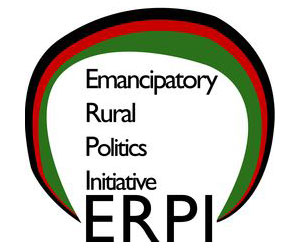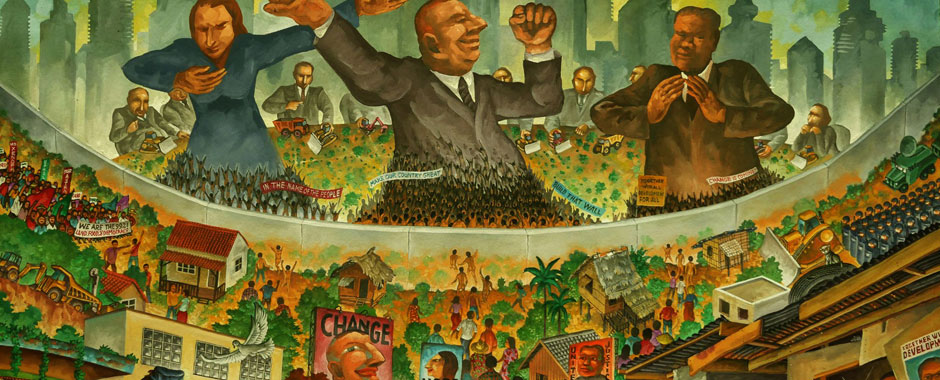Authoritarian populism is on the rise, boosted by support from rural areas. A conference and series of articles examines why, and explores the alternatives: the social and political processes in rural spaces that are resisting or responding to regressive, authoritarian politics.
Organised by the Emancipatory Rural Politics Initiative (ERPI)
- Article series: Jump straight to a list of articles published in openDemocracy by speakers at the conference
- Multimedia story: view selected tweets, images and links from the conference (Wakelet.com)
- Visit the conference website (ISS.nl)
Conference Details
17-18 March 2018
International Institute of Social Studies (ISS)
The Hague
Netherlands
News and updates
To receive news on the outcomes from this event, sign up to our e-newsletter.
Blog posts
Confronting authoritarian populism: building collaborations for emancipatory rural resistance
Sergio Coronado, 23 March 2018 (ISS Blog)
Military muscle and populist promises: authoritarian populism in southern Africa
Ian Scoones, 26 March 2018 (Zimbabweland Blog)
Rural Emancipation in the face of authoritarianism? Reflections of the 2018 Emancipatory Rural Politics Initiative (ERPI) Conference
Alastair Iles, 15 April 2018 (Berkeley Blog)
Social media
To view tweets related to the event, visit the hashtag #ERPI2018 and follow @TheERPI. You can also read a multimedia story with selected tweets and images from the conference.
Facebook: Emancipatory Rural Politics Initiative
Conference papers
In preparation for the conference, the organisers compiled a number of papers and essays submitted by researchers and scholars across the globe.
- Conference papers: Asia-Pacific
- Conference papers: Europe
- Conference papers: Americas
- Conference papers: Americas (2)
- Conference papers: Africa
- Conference papers: International
About the event
 The Emancipatory Rural Politics Initiative (ERPI) focuses on understanding the rise of ‘authoritarian populism’ in rural settings across the world, as well as the forms of resistance occurring and the alternatives being built. New exclusionary politics are generating deepening inequalities, jobless ‘growth’, climate chaos, and social division. The ERPI is focused on the social and political processes in rural spaces that are generating alternatives to regressive, authoritarian politics.
The Emancipatory Rural Politics Initiative (ERPI) focuses on understanding the rise of ‘authoritarian populism’ in rural settings across the world, as well as the forms of resistance occurring and the alternatives being built. New exclusionary politics are generating deepening inequalities, jobless ‘growth’, climate chaos, and social division. The ERPI is focused on the social and political processes in rural spaces that are generating alternatives to regressive, authoritarian politics.
In debating these themes, this international conference aimed tocontribute to ERPI’s aim to provoke debate and action among scholars, activists, practitioners and policymakers from across the world who are concerned about the current situation, and hopeful about alternatives.
The conference brought together around 300 researchers and activists from across five continents. ERPI small grant holders presented research insights, and debates focused on mobilizing alternatives, generating new research-activist networks across the world.
Articles
Articles by speakers and organisers on the online magazine openDemocracy explore the issues around the conference.
Confronting authoritarian populism: the rural dimension / Enfrentarse al populismo autoritario: la dimensión rural
Ian Scoones, Saturnino M. Borras Jr., Lyda Fernanda Forero, Ruth Hall, Marc Edelman, Wendy Wolford, and Benjamin White
29 January 2018
Hindu authoritarianism and agrarian distress
Achin Vanaik
5 February 2018
Why #DefendAfrin? Confronting authoritarian populism with radical democracy
Amber Huff, Salima Tasdemir, and Patrick Huff
12 February 2018
Sacrifice zones in rural and non-metro USA: fertile soil for authoritarian populism
Marc Edelman
19 February 2018
Islamophobia gastronomica – on the food police, rural populism and killing
Raj Patel
26 February 2018
Authoritarian elitism and popular movements in Brazil / Élites autoritarias y movimientos populares en Brasil
Wendy Wolford and Sergio Sauer
5 March 2018
The demise of emancipatory peasant politics? Indonesian fascism and the rise of Islamic populism
Laksmi Savitri, Devi Adriyanti, Hanny Wijaya, Ciptaningrat Larastiti, Abdul Rahman, and Benjamin White
9 March 2018
How populism directed against minorities is used to prop up Myanmar’s ‘Democratic’ revival
Khin Zaw Win
12 March 2018
After the peace agreement, authoritarian extractivism persists as rural development in Colombia
Lyda Fernanda Forero and Danilo Urrea
14 March 2018
State, corporate and chiefly power is being contested from below in South Africa
Ruth Hall
14 March 2018
Cambridge Analytica hacked our social lives to win elections – but more is at stake than votes
Nathan Oxley
23 March 2018
Ongoing conversations: realising an emancipatory rural politics in the face of authoritarian populism
Ian Scoones
24 March 2018
Vladimir Putin and the rural roots of authoritarian populism in Russia
Natalia Mamonova
3 April 2018
‘Authoritarian corpopulism’ supports the rise of sugarcane and oil palm agribusinesses in Guatemala
Alberto Alonso-Fradejas
3 April 2018
A redneck revolt? Radical responses to Trumpism in the rural US
Levi Van Sant
16 April 2018
The Third Great Depression and rise of the far-right: experiences from Turkey
Burak Gürel
25 April 2018
Authoritarian rule shedding its populist skin in rural Cambodia
Alice Beban and Laura Schoenberger
18 July 2018
Speakers
Plenary speakers included:
Burak Gürel (Koç University)
Laksmi Adriani Savitri (Samadhya Institute)
Eduardo Gudynas (Latin American Center of Social Ecology)
Natalia Mamonova (The Institute of International Affairs, Sweden)
Andries du Toit (PLAAS, University of the Western Cape)
Zack Exley (Justice Democrats/Left Right Forward)
Achin Vanaik (Transnational Institute)
Dzodzi Tsikata (University of Ghana)
Khin Zaw Win (Tampadipa Institute)
Rebecca Tarlau (Pennsylvania State University)
John Gaventa (Institute of Development Studies)
Stha Yeni (Tshintsha Amakhaya)
Sofia Monsalve (FIAN International)
Karin Nansen (REDES/Friends of the Earth Uruguay)
Raj Patel (University of Texas at Austin)
Hilary Wainwright (Red Pepper)
Marc Edelman (City University of New York)
Henry Saragih (Serikat Petani Indonesia/La Via Campesina, tbc)
About the ERPI
The Emancipatory Rural Politics Initiative (ERPI) was launched during 2017 as a response to the rise of authoritarian populism in different parts of the world. Our focus is on the rural origins and consequences of authoritarian populism, as well as the forms of resistance and variety of alternatives that are emerging.
Participating institutions include the International Institute of Social Studies (ISS), Cornell University, the City University of New York (CUNY), the Institute of Development Studies, the ESRC STEPS Centre, PLAAS, and the Transnational Institute (TNI).

